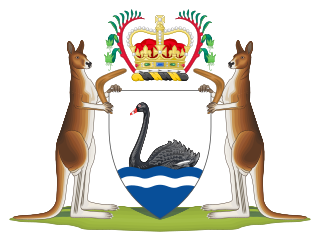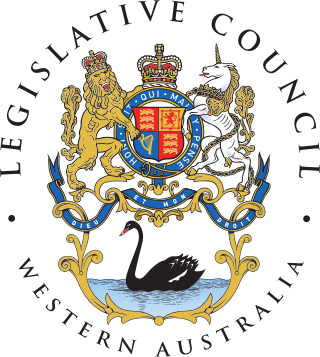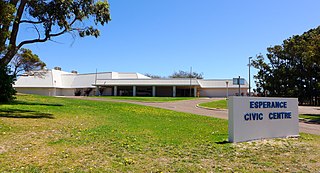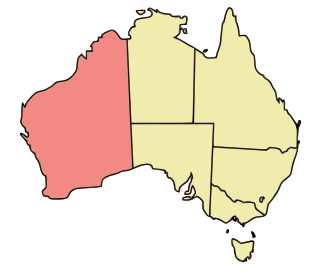Related Research Articles

The Australia Act 1986 is the short title of each of a pair of separate but related pieces of legislation: one an act of the Parliament of Australia, the other an act of the Parliament of the United Kingdom. In Australia they are referred to, respectively, as the Australia Act 1986 (Cth) and the Australia Act 1986 (UK). These nearly identical Acts were passed by the two parliaments, because of uncertainty as to whether the Commonwealth Parliament alone had the ultimate authority to do so. They were enacted using legislative powers conferred by enabling acts passed by the parliaments of every Australian state. The acts came into effect simultaneously, on 3 March 1986.

The City of Cockburn is a local government area in the southern suburbs of the Western Australian capital city of Perth about 8 kilometres (5 mi) south of Fremantle and about 24 kilometres (15 mi) south of Perth's central business district. The City covers an area of 167.5 square kilometres (64.7 sq mi) and had a population of over 104,000 as at the 2016 Census.

The Parliament of Western Australia is the bicameral legislature of the Australian state of Western Australia, which constitutes the legislative branch of the state's political system. The parliament consists of the King, the Legislative Council and the Legislative Assembly. The two houses of parliament sit in Parliament House in the state capital, Perth.

Esperance is a town in the Goldfields–Esperance region of Western Australia, on the Southern Ocean coastline approximately 720 kilometres (450 mi) east-southeast of the state capital, Perth and 391 kilometres (243 mi) south of Kalgoorlie. The urban population of Esperance was 12,003 at June 2018. Its major industries are tourism, agriculture, and fishing.

The Western Australian Legislative Council is the upper house of the Parliament of Western Australia, a state of Australia. It is regarded as a house of review for legislation passed by the Legislative Assembly, the lower house. The two Houses of Parliament sit in Parliament House in the state capital, Perth.

The Eastern Railway is the main railway route between Fremantle and Northam in Western Australia. It opened in stages between 1881 and 1893. The line continues east to Kalgoorlie as the Eastern Goldfields Railway.
Council rangers are officers employed by local government areas in Australia to enforce the by-laws of those local governments and a limited range of state laws relating to such matters as litter control, animal control, dog laws, cat laws, bush fire control, off-road vehicles, emergency management, and parking. A Council Ranger is also referred to as Local Laws Officers in some of Australia's eastern states.

The Agricultural Region is a multi-member electoral region of the Western Australian Legislative Council, located in the South West, Peel and part of the Great Southern regions of the state. It was created by the Acts Amendment Act 1987, and became effective on 22 May 1989 with five members who had been elected at the 1989 state election three months earlier. At the 2008 election, it was increased to six members.

The East Metropolitan Region is a multi-member electoral region of the Western Australian Legislative Council, located in the eastern and south-eastern suburbs of Perth. It was created by the Acts Amendment Act 1987, and became effective on 22 May 1989 with five members who had been elected at the 1989 state election three months earlier. At the 2008 election, it was increased to six members.

The Mining and Pastoral Region is a multi-member electoral region of the Western Australian Legislative Council, located in the northern and eastern regions of the state. It was created by the Acts Amendment Act 1987, and became effective on 22 May 1989 with five members who had been elected at the 1989 state election three months earlier. At the 2008 election, it was increased to six members.

The North Metropolitan Region is a multi-member electoral region of the Western Australian Legislative Council, located in the north-western and western suburbs of Perth. It was created by the Acts Amendment Act 1987, and became effective on 22 May 1989 with seven members who had been elected at the 1989 state election three months earlier. At the 2008 election, it was decreased to six members.

The South Metropolitan Region is a multi-member electoral region of the Western Australian Legislative Council, located in the southern suburbs of Perth, Western Australia. It was created by the Acts Amendment Act 1987, and became effective on 22 May 1989 with five members who had been elected at the 1989 state election three months earlier. At the 2008 election, it was increased to six members.

The South West Region is a multi-member electoral region of the Western Australian Legislative Council the South West, Peel and part of the Great Southern regions of the state. It was created by the Acts Amendment Act 1987, and became effective on 22 May 1989 with seven members who had been elected at the 1989 state election three months earlier. At the 2008 election, it was reduced to six members. The region includes the cities of Albany, Bunbury and Mandurah.

The states and territories are the second level of government of Australia. The states are partially sovereign, administrative divisions that are self-governing polities, having ceded some sovereign rights to the federal government. They have their own constitutions, legislatures, executive governments, judiciaries and law enforcement agencies that administer and deliver public policies and programs. Territories can be autonomous and administer local policies and programs much like the states in practice, but are still legally subordinate to the federal government.
The Heritage Council of Western Australia is the Government of Western Australia agency created to identify, conserve and promote places of cultural heritage significance in the state.

The Shire of Esperance is a local government area in the Goldfields-Esperance region of Western Australia, about 400 kilometres (250 mi) south of the town of Kalgoorlie and about 720 kilometres (450 mi) east-southeast of the state capital, Perth. The Shire covers an area of 42,547 square kilometres (16,427 sq mi), and its seat of government is the town of Esperance, where about three-quarters of the Shire's population resides.
The Barnett Ministry was the 35th Ministry of the Government of Western Australia. It included 13 members of the Liberal Party, three members of the National Party and an independent. It was led by the Premier of Western Australia, Colin Barnett, and Deputy Premier Liza Harvey. It succeeded the Carpenter Ministry on 23 September 2008 following the 2008 election and was succeeded by the First McGowan Ministry following the Liberal Party's defeat at the 2017 election.

Aboriginal communities in Western Australia are communities for Aboriginal Australians within their ancestral country; the communities comprise families with continuous links to country that extend before the European settlement of Australia.

Lesbian, gay, bisexual and transgender (LGBTQ) rights in Western Australia have seen significant progress since the beginning of the 21st century, with male sex acts legal since 1990 and the state parliament passing comprehensive law reforms in 2002. The state was the first place within Australia to grant full adoption rights to same-sex couples in 2002. As of 2024, Western Australia is the only place within Australia to ban altrustic surrogacy for same-sex couples and also the only mainland state to still legally allows conversion therapy practices.
References
- ↑ Wagner, Martin; Lambert, Scott (21 November 2017). Freshwater Microplastics: Emerging Environmental Contaminants?. Springer. p. 252. ISBN 978-3-319-61615-5.
- ↑ "WALW - Litter Act 1979 - Home Page". www.legislation.wa.gov.au.
- ↑ Australia, Western (1997). The Reprinted Acts of the Parliament of Western Australia: Reprinted Under the Authority of the Amendments Incorporation Acts of 1923 and 1938, to 30th Day of November, 1939. F.W. Simpson, Government Printer. p. 15.